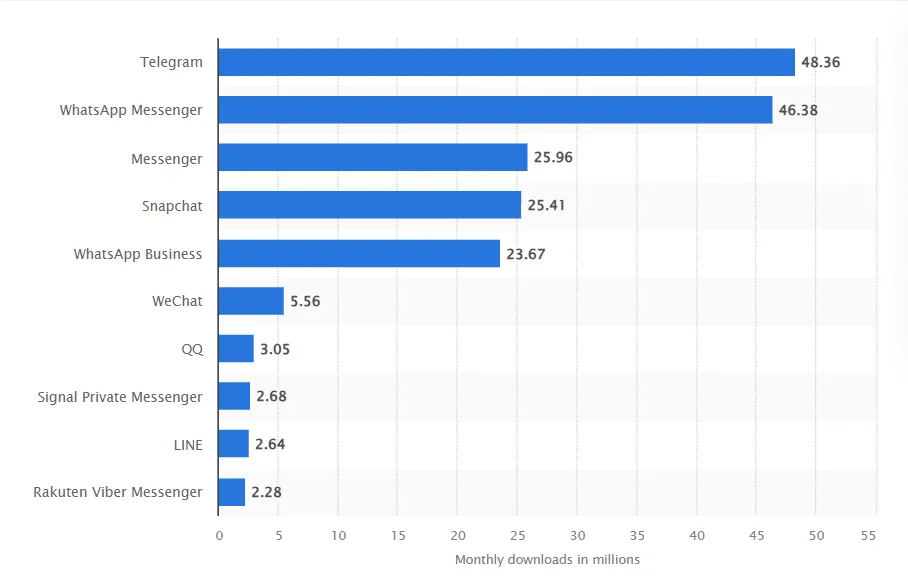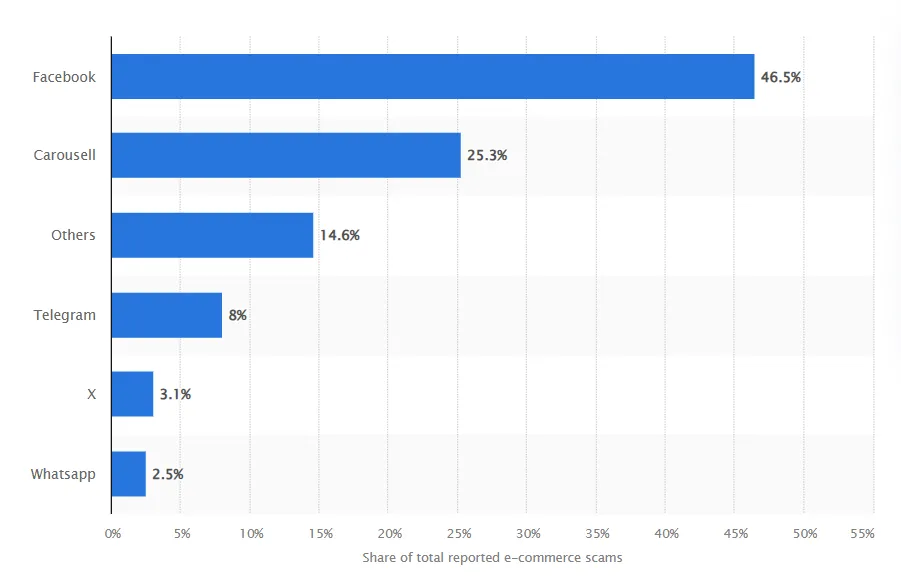In July 2024, Telegram emerged as the most downloaded mobile messenger app globally, boasting over 48 million downloads. It outperformed WhatsApp, which ranked second with around 46 million downloads, and Meta-owned Messenger, which secured third place with approximately 26 million downloads [1].

Telegram’s user-friendly features and emphasis on privacy have contributed to its rapid growth but have also attracted fraudsters who exploit the app for various scams.
In this article, we’ll focus on the rise of Telegram scams in Southeast Asia, explore cybercriminals’ tactics, and share tips on how to protect yourself.
Telegram scams increasing in Southeast Asia
Criminal groups in Southeast Asia are using the messaging app Telegram more often to organize their actions, changing how organized crime operates, says a United Nations report released on Monday. The report comes after France filed charges against Telegram’s founder, Pavel Durov, claiming he allows criminal activity on the platform. This case is moving forward under a new law that has no previous international example.
The UN Office on Drugs and Crime (UNODC) reports that underground data markets (illegal platforms where sensitive or stolen information, such as personal details, login credentials, and financial data, is bought and sold) are moving to Telegram, where sellers aim to work with Southeast Asian organized crime groups. These illegal networks generate an estimated $27.4 billion to $36.5 billion each year. Criminals are also using advanced technologies like deepfake software and data-stealing malware to strengthen their operations [2].
For example, Singapore is facing a high volume of scams reported across various e-commerce platforms, with some of the largest shares of cases linked to popular sites and apps used for shopping and social interactions. According to Statista, in 2023, Telegram was among the top platforms where scams were reported, as fraudsters exploited its group chat and channel features to reach potential victims [3].

The number of scam cases reported on Telegram spiked by 137 percent in the first half of 2024 compared with the same period in 2023.
On Oct 21, at the Global Anti-Scam Summit Asia 2024 held at Suntec Singapore Convention and Exhibition Centre, Minister of State for Home Affairs Sun Xueling highlighted a rise in scams on online platforms, with Telegram becoming a notable area of concern.
She noted, “Specifically, we have observed that scammers are creating and adding unsuspecting victims into channels and chat groups on Telegram and deceiving them into parting with their monies.
Many scams involved fake investment opportunities, job offers, and counterfeit goods, as well as phishing links and payment fraud [4].
Common scams using Telegram:
Here are some Telegram scams you should watch out for [5][6]:
- Phishing Scams: These scams trick users into clicking malicious links that lead to fake websites designed to steal personal information. Scammers may also use AI bots to call victims and pose as representatives from banks and financial companies, such as PayPal, and convince the user to give sensitive information.
- Romance Scams: Scammers create fake profiles on dating apps like Tinder, Hinge, and Bumble, build relationships, and then move the conversation to Telegram. They eventually ask for money, often for reasons like travel expenses or gifts. Once they receive the funds, they make excuses to avoid meeting in person.
- Tech Support Scams: Fraudsters pose as Telegram tech support, claiming account issues and asking for personal information to “resolve” them or request that you pay for “premium” support. If you encounter technical problems, contact official support channels directly.
- Friend in Need Scams: In this scam, fraudsters gather enough details about your friends or family members to impersonate them on Telegram. The scammers then contact you, asking for help with a pressing issue. For instance, they might claim they need funds for medical bills, or say they’re stuck abroad and urgently require money to get home. Always verify such requests with the person directly.
- Investment Scams: Fraudsters claim to be experts and promise victims high returns on investments with little effort, often using fake market data to lure them into sending money for bogus opportunities.
- Fake Job Fraud: Scammers pose as recruiters and post job offers with high salaries and attractive benefits on Telegram, tricking victims into sharing personal details during fake interviews.
- Malicious Links or Attachments: Scammers may send links or files that contain malware, which can compromise users’ devices and steal personal data via direct messages. Once the victim clicks on it, it may infect the device, and then the scammer steals personal information or blackmails the victim.
- Fake Prizes and Giveaways: Scammers impersonate brands or celebrities, claiming to run giveaways to collect personal information without delivering any prizes.
- Fake Telegram Admins: Fraudsters create accounts that closely mimic official Telegram admins to fool users by sending private messages instead of sending to the group.
- Fake Ad Scams: Scammers create fake ads for items and ask potential buyers to communicate via Telegram, where they steal personal information.
- Copycat Scams: These involve scammers creating fake channels that look like legitimate ones with the same picture and username to trick users into providing personal information.
- Crypto Scams: Scammers pose as crypto experts and promise “guaranteed” returns of up to 50% on crypto investment and encourage users to open accounts on fake exchanges. Victims may see initial profits but lose everything when trying to withdraw, as scammers disappear.
How to spot a Telegram scam:
To identify fake accounts on Telegram, you can follow several key indicators [6]:
-
- Profile Picture and Username: Check for generic or stolen profile pictures. Scammers often use images from the internet rather than personal photos. Be cautious of usernames that resemble well-known figures or organizations but have slight variations or when usernames and display names don’t match.
- Suspicious Activity: Genuine accounts tend to have consistent engagement, such as participating in discussions or sharing relevant content. In contrast, fake accounts often have minimal activity or only share spammy content. Be wary of profiles that lack interaction with others and send messages containing suspicious links or request personal information.
- Contact Information: Fake accounts often omit giving contact details, such as emails or links to official websites, or provide misleading details. If you notice inconsistencies in the contact information, it’s a red flag.
- Verification Badges: Look for verification badges (similar to blue ticks on other platforms) that indicate the account is verified by Telegram. While not all legitimate accounts are verified, the presence of a badge can help confirm authenticity.
How to protect yourself
To stay safe from scams on Telegram, follow these tips [6]:
-
- Keep sensitive information private: Avoid sharing personal or financial details, as reputable companies won’t request passwords or banking info via messaging apps.
- Avoid clicking on suspicious links: Be wary of clicking on unfamiliar links or downloading files, even from known contacts whose accounts might be compromised.
- Review your privacy settings: Regularly update your Telegram app and use privacy settings to control who can access your information and keep your phone number hidden for added privacy. Ensure your devices have up-to-date antivirus protection.
- Turn on Two-Factor Authentication (2FA): Enabling 2FA adds an extra layer of security to your account, even if your password is leaked.
Protect Your Social Media Presence with Eydle
Telegram scams are on the rise, and businesses, especially financial institutions, are increasingly at risk of brand impersonation and fraud. As cybercriminals grow more sophisticated, they exploit social platforms to deceive customers, spread fake accounts, and damage reputations. That’s where Eydle steps in.
With AI technology developed by experts from MIT, Stanford, and Carnegie Mellon, Eydle provides real-time monitoring to prevent your organization from online scams. Our advanced model identifies fake accounts, fraudulent posts, and malicious activity, protecting your company’s online presence and ensuring that your brand stays secure.
Learn more at www.eydle.com or reach out at [email protected].
Sources:
- https://www.statista.com/statistics/1263360/most-popular-messenger-apps-worldwide-by-monthly-downloads/
- https://www.occrp.org/en/news/telegram-enables-se-asian-crime-networks-un-warns
- https://www.statista.com/statistics/1107023/singapore-leading-platforms-used-e-commerce-scams/
- https://www.straitstimes.com/singapore/rise-in-criminal-activity-and-scams-on-telegram-extremely-worrying-sun-xueling
- https://www.aura.com/learn/telegram-app-scams?
- https://www.bitdefender.com/en-gb/blog/hotforsecurity/8-telegram-scams-how-not-to-get-scammed/




